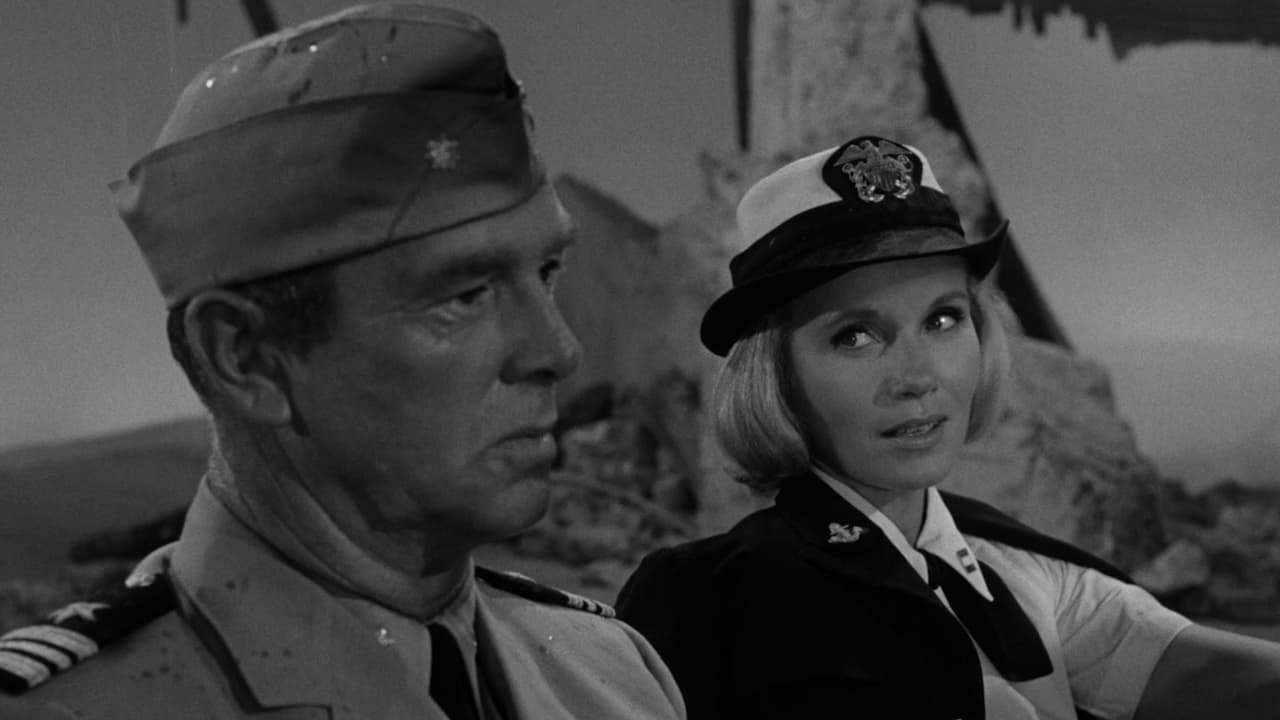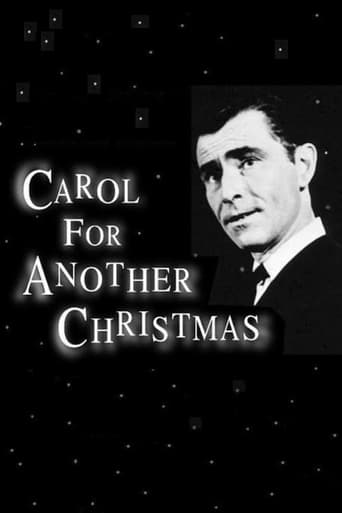Auntie_Inflammatory
Daniel Grudge (Sterling Hayden) is visited on Christmas Eve by his nephew, Fred (Ben Gazzara). Fred's angry because Grudge nixed a plan for the university he works at to have a "cultural exchange" with a university in Poland. They argue isolationism vs. interventionism and both arguments are ridiculously extreme, veering off into monologues. You're not supposed to like Grudge but Fred isn't likable either. He comes across as a jerk while talking about Grudge's (war) dead son. Grudge dismisses Fred and, moments later, is magically transported onto a ghostly freighter carrying war-dead from all wars and nations. Here, he meets The-Ghost-of-Christmas-Past (Steve Lawrence), an every-man soldier who speaks Brooklynese. Grudge shows little surprise and no fear at either the sudden change of scenery or meeting a ghost on a ship full of coffins. Past-ghost argues against isolationism and his rebuttals to Grudge turn into speeches. Lawrence gives a very good performance but his argument is too naïve and simplistic. "So long as you talk you don't fight." Oh...I guess if we'd just talked to Hitler all that nastiness in the '40s could've been avoided.After trying to make Grudge feel guilty for not wanting the U.S. to get involved in foreign wars, Past-ghost contradicts himself by trying to make him feel guilty for having served in WW2! He has Grudge relive a time, 20 years earlier, when he (Grudge) was in the Navy and visited some Japanese children disfigured by the bomb dropped on Hiroshima. One of the bandaged, faceless girls sings a delicate, haunting song because it's more poignant when a suffering person can sing nicely. There's a disturbing, "Look what big, bad America did", vibe to this segment. Grudge's WAVE driver (Eva Marie Saint) acts more civilian than corps-woman. She guilt-trips Grudge about the bombing (as if he's personally responsible) even though, he points out, it likely saved 500,000 American and 2,000,000 Japanese lives.Grudge is then directed to a sound-stage where he meets The-Ghost-of-Christmas-Present (Pat Hingle). Present-ghost represents the human race and gorges himself on a feast, while starving refugees watch from behind barbed wire, in an attempt to make Grudge feel guilty for not caring enough about the poor.Present-ghost gives Grudge a couple of long lectures/speeches on humanity, quoting statistics about poverty, disease and hunger. While he sermonizes, the refugees sing beautiful, sad songs in their native languages because all poor and/or oppressed and/or suffering people sing like angels. Cue shots of shabby, displaced persons, sitting forlornly in the snow, complete with sad-eyed children.Grudge finally gets sick of being preached at and runs away (I would've fled 5 minutes sooner!), finding himself in a post-apocalyptic future and meeting The-Ghost-of-Christmas-Future (Robert Shaw). Whaddaya know, Future-ghost likes to make lengthy, dramatic speeches too!The arrival of a band of WW3 survivors and their charismatic leader, The Imperial Me (Peter Sellers), seems a reprieve from the speechifying, but no! IM makes a speech! His wackiness livens things up somewhat but it's too little, too late. When IM proposes eliminating the other survivors "down yonder" and "cross river", you half expect "One Tin Soldier" to start playing in the background.Grudge's servants, Charles (Percy Rodrigues) and Ruby (Barbara Teer), are among the survivors. They're the only people with any humanity left and Charles - you guessed it! - makes a speech to persuade their group to talk to the other groups. He's rewarded by getting charged with "the treason of involvement", being harassed by the crowd, and finally getting blown away by Mike Teevee's little brother. I guess if he'd been killed by an adult it wouldn't have been as much of a "comment on society". At least director Joe Mankiewicz (or Serling) refrained from going full lib-tard, and making it a race thing, by including several Black survivors in the crowd that laughs at Charles and encourages him to jump.With pesky Charles out of the way, IM returns to HIS preaching. This gets too silly. After restating his directive to kill the other bands of survivors, he says that his group should then pick off each other, until only one person remains. Even among crazies, the enthusiasm for this plan seems doubtful.After IM and co. disperse, Future-ghost gives Grudge another (albeit mercifully short) lecture which includes gems like, "When the first bomb dropped on Hiroshima the fate of men could've been predicted by a cut-rate gypsy!" He's saying that the U.S. is directly responsible for WW3!When Grudge awakens Christmas morning - surprise - his grudgey heart has grown three sizes that day! Fred arrives and Grudge tells him that he's decided to jump on board with the whole "involvement" thing. And now he even likes Christmas carols. God bless us, every one!The ghosts in "A Christmas Carol" taught Scrooge the error of his ways by SHOWING him scenes from his past, present, and possible future. They didn't try to TALK HIM TO DEATH with interminable, preachy speeches!It's as if someone took all the monologues from a monologue slam on interventionism, poverty, and war, strung them together, and wrote a few minutes of dialogue and stage directions linking them together to form a screen-play. The performances are good (particularly Lawrence, Hingle, Shaw, Sellers, and Rodrigues) but, for the love of God, STFU already!In "A Christmas Carol" Scrooge's actions only affect the lives of himself and those closest to him but in "CFAC" Grudge's actions affect the whole world? His okaying the exchange program with Poland and giving money to charity is going to prevent WW3? Whaaat?!This was part of a series of specials designed to promote the U.N. The "blame America" sentiments aren't surprising, considering how Anti-American the U.N. later turned out to be.It's worth viewing once, just for some of the performances and the sheer oddity of it all. You won't want to make it a tradition.
trevillian2
First off I am a Rod Serling fan. Second I do not like this movie.. It is a once around as far as I am concerned. I know the story is not so cheery when the various ghosts visit and should end in a positive way with scrooge reforming and becoming a very pleasant person to know. In this version I don't think I would care to know him even after he has had his visits. It will shake you up, and make you think, but I have no desire to own it for secondary viewing. I was left feeling like the whole tale was a major bummer. It is very political and brings out anti-war feelings that were very strong in 1964. We were getting deeper into Vietnam, and of course Kennedy was fresh in every ones minds, so I am sure this hit hard with the message of this movie. I say see it if you are curious, but if you like the happier, upbeat versions this is not for you. By the way I don't like Scrooged either.
bkoganbing
Carol For Christmas is about 20 years behind the time when it was presented on TV in 1964. It would have had far more appeal had television been available in 1944.Industrial tycoon Sterling Hayden is bitter at the world because his son Marley died in World War II. He's the last of the isolationists and wants no foreign involvement anywhere period including humanitarian aid.The error of his ways is told to him by those spirits of Christmas past, present and future. And if you know the Dickens story and how many in the English speaking world have never heard of it than you pretty much know what the story is.If this had been done in 1944 when Hayden's son was killed, a lot of people invested their hopes and dreams in a new world organization to come, the planning of which was undertaken even while the guns were still blazing in battle. The story would have resonated well with World War II audiences.As it is coming out in 1964 before the troop escalation in Vietnam the film came out under the wire. Five years later, ten years later, it would have met with derision from Vietnam era audiences. The message still has problems today with the issues surrounding globalization.However one portion of it rings very true for what has been determined to be the 'Me' generation. How prescient were the writers in creating Peter Sellers's character of 'Me' the symbol of the ugly American who believes in selfishness and divisiveness. Just grab what you can, whenever you can and if some in the world don't have as much, too bad. Not to mention if they protest, kill them. This part of Carol For Christmas was as prophetic as Network in its way.I caught this over the Christmas holiday, make sure if you haven't seen it, catch it next year if TCM runs it again.


